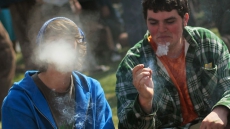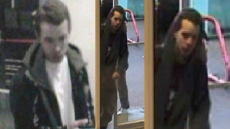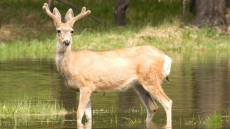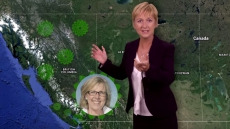TORONTO — The uncle of the three-year-old Syrian boy whose lifeless body has put a devastating human face on the Syrian refugee crisis has assailed Canada's refugee process.
Rocco Logozzo told The Canadian Press that the system doesn't work, adding his family had money and plenty of room to house little Aylan Kurdi and his brother and parents at his home in Coquitlam, B.C., and had put in a private sponsorship request.
Instead, the family and a B.C. politician says Canada rejected the request in June. It wasn't immediately clear why they were turned down.
"The whole thing was designed to fail ... when they heard (the refugee application) failed, they lost all hope, and in a desperate situation, you make all these wrong decisions," Logozzo said as he explained why his relatives opted to get on a boat in coastal Turkey, on the Aegean Sea, to try to get to Europe.
According to Citizenship and Immigration Canada, those who are abroad but outside their home countries and seeking refuge must either be referred by the United Nations High Commissioner for Refugees or another referral agency — or be sponsored by a private sponsor.
They must be selected as a government-assisted or privately sponsored refugee, or have the funds needed to support themselves and any dependents after arriving in Canada.
Logozzo said he and wife, Tima Kurdi, have been grieving since hearing the news that their nephews — Aylan and his five-year-old brother, Galip — and their mother, Rehan, died as they tried to reach their destination.
They were among at least 12 migrants, including five children, who drowned Wednesday when two boats carrying them to the Greek island of Kos capsized.
Logozzo said the boys' father, Abdullah, who is Tima Kurdi's brother, survived after their speed boat was struck by a large wave. He said Abdullah told his sister that he put lifejackets on both boys, but they somehow slipped off when the boat flipped over.
Tima Kurdi was too heartbroken to talk at length on Thursday.
"I'm not feeling well," she said through sobs. "I can't talk."

Fin Donnelly, who is running for re-election in Port Moody-Coquitlam, has been working with Logozza and his wife in their attempts to bring their relatives to Canada.
The NDP politician said he delivered a letter on behalf of Kurdi to Citizenship and Immigration Minister Chris Alexander in March, but the sponsorship request was not approved.
Alexander said in a statement that he was "deeply saddened" by the image of the drowned boy. His campaign said he was returning to Ottawa on Thursday to deal with the crisis.
"The tragic photo of young Aylan Kurdi and the news of the death of his brother and mother broke hearts around the world," Alexander said. "I am meeting with officials to ascertain both the facts of the case of the Kurdi family and to receive an update on the migrant crisis."
He added Prime Minister Stephen Harper has set a target for Canada to accept 23,000 Iraqis refugees and 11,300 Syrians.
"Of that number Canada has already resettled nearly 22,000 Iraqis and 2,300 Syrians," Alexander said.
About 250,000 people have been killed and more than one million wounded in Syria since March 2011, according to United Nations officials. More than half the country's population has been displaced, including more than four million who have fled Syria.
The route between the Turkish community of Bodrum and Kos, just a few kilometres, is one of the shortest from Turkey to the Greek islands, but remains dangerous. Hundreds of migrants a day attempt the perilous sea crossing despite the risks.
A UN panel reported Thursday that more than 2,000 Syrians have drowned in the Mediterranean while trying to reach Europe since 2011 and said there's no end in sight to Syria's civil war. In its 10th such report since the war began 4-1/2 years ago, the UN Human Rights Council urges the international community to help Syrian civilians.
WORLD'S MEDIA NOTE CANADIAN CONNECTION TO TRAGIC STORY OF SYRIAN BOY

WASHINGTON — As the world's media relayed images of a lifeless Syrian boy on a beach, many outlets on different continents noted the Canadian connection to the tragic story.
A headline across Italy's La Repubblica website quoted Aylan Kurdi's father: "I don't want asylum in Canada anymore — I'll take my son back to Kobane."
And a Canadian election campaign that days earlier seemed immersed in the far-less-internationally-compelling debate over Mike Duffy's expenses was suddenly tied to the most important story in the world.
UK's Independent newspaper ran a headline on a breaking development from the federal election trail: "Canadian immigration minister suspends election campaign to investigate why Syrian family's refugee application was refused."
It was a similar headline in Algeria's El Watan newspaper: "Canada refused asylum to the family of little Aylan Kurdi."
Most of these stories were sidebars to the bigger-picture challenge of the world's worst refugee crisis since the Second World War, as illustrated by French news sites which mainly focused on President Francois Hollande and German chancellor Angela Merkel demanding that other European countries do more.
Even on the Independent website, above the headline about Chris Alexander leaving the campaign trail, the main story Thursday evening was illustrated by pictures of people holding up signs demanding that Prime Minister David Cameron welcome more refugees.
It was also the main story in most U.S. media.
The top item on the New York Times website was the intra-European spat over how to handle the crisis, with Hungary's prime minister describing it as a German problem and urging other EU countries to tell migrants they're not welcome.
The No. 2 story in the Times: "Family of Drowned Syrian Boys Sought to Reach Canada."
The story and its Canadian connection received similar treatment in USA Today, Time magazine's website and the New York Daily News.

The crisis was the top story on the hourly newscast of the U.S.'s National Public Radio. Fox News ran a segment on the heartbreaking image, asking whether Europe should take in more migrants and inviting Iran-Contra scandal actor Oliver North on to blame President Barack Obama for the crisis.
Obama's failure to take out Syrian dictator Bashar al-Assad early on led to a protracted war that helped build ISIS and the refugee crisis, North said.
CANADA FAILED FLEEING BOYS WHO DROWNED, REFUGEE GROUP SAYS
A refugee advocacy group says two young boys who drowned off the coast of Turkey could be alive today if Canada had responded better to the Syrian refugee crisis.
Aylan Kurdi, 3, and his brother Galip, 5, died with their mother while fleeing to Europe after their application to resettle in Canada was denied.
The Canadian Council for Refugees is calling for Syrians with family in Canada to be allowed entry immediately to complete processing in safety.
The council wants flexible measures — such as temporary resident permits — for Syrians with relatives in Canada.
It notes the boys had an aunt in Canada and likely would have been able to get a Turkish exit permit if they were leaving to reunite with family.
The Canadian Association of Refugee Lawyers accused the Conservative government of turning its back on desperate people. "This Syrian refugee crisis is one of the worst humanitarian tragedies of the past century and this government has utterly failed to respond in any meaningful way."
The Conservatives have said their approach balances humanitarian assistance with a military effort against radicals rampaging through Syria.
In January, the government promised 10,000 Syrian refugees a home in Canada over the next three years.
They say that, as of late July, 1,002 people had resettled in Canada as part of that commitment. That's in addition to 1,300 Syrians settled under a pledge made in 2013.
The council for refugees urges an immediate commitment to a minimum of 10,000 government-assisted resettlement places for Syrians, in addition to Canada's regular resettlement numbers.
Current Canadian promises to take in Syrian refugees are made within existing commitments, so the numbers simply displace other refugees, the council said.
In past refugee crises Canada responded quickly and decisively, the council said Thursday. "In 1999 Canada took extraordinary measures to evacuate thousands of Kosovar refugees. The same level of commitment is needed now."
The council also wants elimination of barriers to the private sponsorship of refugees, including restoration of full interim federal health coverage and lifting of document requirements for groups who offer to sponsor refugees.

"These small boys could be alive today, if Canada had responded more appropriately to the Syrian refugee crisis," said Loly Rico, the council's president.
"We shouldn't need to wait for a tragedy like this to realize we must open our doors. We don't want to see any more children die in this way."





